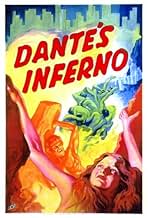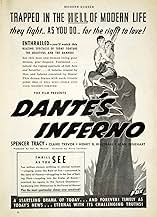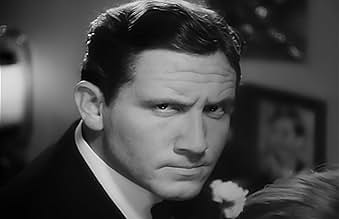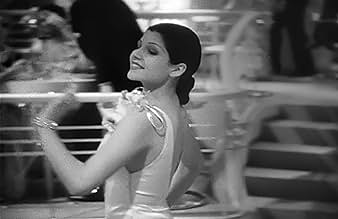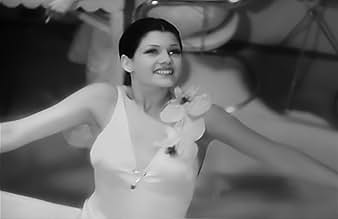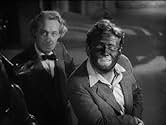Aggiungi una trama nella tua linguaJim Carter moves in on the McWade's carnival concession which shows scenes from Dante's "Inferno". He makes it a going concern, marrying Betty along the way. An inspector calls the amusement... Leggi tuttoJim Carter moves in on the McWade's carnival concession which shows scenes from Dante's "Inferno". He makes it a going concern, marrying Betty along the way. An inspector calls the amusement pier unsafe but Carter bribes him. The pier collapses, leading to the inspector's suicide... Leggi tuttoJim Carter moves in on the McWade's carnival concession which shows scenes from Dante's "Inferno". He makes it a going concern, marrying Betty along the way. An inspector calls the amusement pier unsafe but Carter bribes him. The pier collapses, leading to the inspector's suicide, injury to Pop McWade, trial for Carter, and Betty's leaving him. Carter starts over with... Leggi tutto
- Regia
- Sceneggiatura
- Star
- Premi
- 1 candidatura in totale
- Alexander Carter
- (as Scott Beckett)
- Dancer
- (as Rita Cansino)
- Girl in Stoke-Hold
- (non citato nei titoli originali)
- Man in Stoke-Hold
- (non citato nei titoli originali)
- Mr. Williams
- (non citato nei titoli originali)
- Girl in Stoke-Hold
- (non citato nei titoli originali)
- Concessionaire's Wife
- (non citato nei titoli originali)
- Photographer
- (non citato nei titoli originali)
- Passenger in Boiler Room
- (non citato nei titoli originali)
- Amusement Park Patron
- (non citato nei titoli originali)
Recensioni in evidenza
Tracy plays a man who lucks into carnival barking as a result of meeting a man, played by Henry B. Walthall, who runs a concession known as "Dante's Inferno." Walthall soon becomes Tracy's father-in-law, and Tracy becomes a successful businessman.
He launches a huge, gaudy Inferno employing ruthless means to get the property. Though a wonderful husband and father, in his corporate world, he stops at nothing to get what he wants, including cheating, bribery, and ignoring possible dangers. The consequences are disastrous.
The film has an obvious allegory, and I'm still laughing at a previous poster who noted that when Walthall goes through a book with Tracy and the seven rungs of hell come to life, everyone had great physiques so hell must not take chubsters! It's true!
Other than hell's preference for perfect 10s, the effects are amazing - the Inferno concession, the images in the book that come to life, and the fantastic ship scene which uses the Inferno images to great effect.
Spencer Tracy is excellent in his role, a tender dad, sweet husband and cruel businessman all at the same time. Claire Trevor is young and lovely and provides strong support for Tracy.
A very interesting film and highly recommended.
*** (out of 4)
Impressive drama about a con man (Spencer Tracy) who gets a job at a carnival when an elderly man (Henry B. Walthall) hires him as a barker. The two men create the "Dante's Inferno" show, which Walthall uses to warn people but Tracy sees it as a way to get rich. Soon he will stop at nothing for the all mighty dollar but this will soon backfire when his wife (Claire Trevor) has to betray her own morals for him. There are a few faults in the film but overall this is a pretty strong little gem that contains three great sequences that make it a must see. The first one is the carnival attraction that has some rather amazing sets and terrific visuals. Another brilliant scene is the ending with a large ship catching fire. The third masterful touch is a famous sequence of Hell where we get to see thousands of people burning for eternity. All three of these scenes contain some thrilling entertainment and especially the sequence in Hell. I was really surprised to see how graphic some of these scenes where considering the Hayes Office was coming down on this type of thing. I also could have sworn there were a couple nude shots during this sequence but it was somewhat hard to tell. Another reason to watch this film are for the performances with Tracy delivering once again. The most impressive thing is that Tracy is so good at playing cold that you can't help but fall for everything he does in the film. He gets to show off a nicer side as well and he perfectly blends the two depending on the scene in question. Trevor is also in fine form as his wife and she gets some pretty good moments early on as her good ways must be thrown out the window in order to save her husband. Walthall turns in one of the best performances I've seen from him in the sound era and he actually steals the film from everyone. He's tour of Dante's Inferno is very good as is another sequence where he first meets Tracy's character. Rita Hayworth shows up at the end as a dancer so keep your eyes open for her. The film's major fault is that it gets too preachy at times and I think it goes a tad bit over the top in regards to some of the deeds that Tracy does. I think the film could have done without Hayworth's dance sequence as well as it really feels out of place with the rest of the film. And if you're keeping track with how many A-list Hollywood stars who appeared in blackface at some point in their career then you can add Tracy.
In the main part of the 1935 movie, Tracy plays an unscrupulous amusement park owner who decides his next attraction will be a trip through Hell called "Dante's Inferno". In his usual corner-cutting manner, fire protection measures are short-changed with the inevitable result that there is a disastrous fire. Following this is a dream sequence in which Dante's vision of Hell is re-enacted and Tracy is appropriately punished. Finally there is an ending that I won't reveal.
The non-fantasy part of the story is strikingly similar to an actual, highly publicized, event that took place about 20 years earlier than the conception of the movie. At that time, Coney Island, which is part of Brooklyn, itself part of New York City, was the premier amusement park area of the world. There were two parks, Steeplechase, which emphasized fun and sex, and Luna Park, which emphasized art and youth. William H. Reynolds, an underhanded real estate developer and former Republican state senator, was attracted by the profits and decided to create a third giant park. He called his Dreamland.
Following his typical pattern, Reynolds, through his ties to the corrupt Tammany Democratic political machine, was able to have streets closed to make some inexpensive land suitable for a large amusement park. This deprived poor people of access to the beach, but so what? Patrons of his park, and of luxury hotels, had no problem.
Oddly, his concept, despite the usual sleazy attractions, also had morality, even religiosity, as a major theme. It started off with an attraction called Genesis, the Bible story of the creation of the world. There was another called Destruction of Pompeii, presumably as payment for wickedness. His crowning effort along this line was called Hell Gate, a fantasy ride through Hell, with a gigantic Satan smirking over the entrance.
In the early hours of May 27, 1911, as they rushed to ready the attraction for the Spring opening, workers accidentally started a fire. Firefighters responded, but because of low water pressure (for which many also blamed Reynolds' machinations), could not prevent its spread and all of Dreamland, including Hell Gate, was destroyed.
Don't you agree that the inspiration, if not the actual plot of the movie Dante's Inferno, was drawn from real life? And isn't it amusing that, considering his behavior, Reynolds was so preoccupied with morality and retribution?
Incidentally, I saw this film when I was 15 and it scared me silly.
Tracy plays a ship stoker and would be con man who gets fired off his ship for malingering. Down on his luck, kindly old Henry B. Walthall who owns a sideshow attraction at a carnival midway takes him in and Walthall's daughter Claire Trevor falls for him.
Spence is nothing if not determined to make something of himself and he becomes a rich man in the amusement game. But his ethics leave a lot to be desired.
The title is not Dante Alighieri's famous poetic saga of his journey through hell, but it's the name of the exhibit that Walthall owns. It's 'educational' but Tracy starts on his road to financial success by glamorizing the more prurient aspects of it.
The Inferno catches fire and there's a climatic ship's fire as well that Cecil B. DeMille could not have staged better. One wishes the film had been in color for that as well as the imaginary ten minute journey through hell that Walthall describes to Tracy.
The dancing team on the ship before the fire marks the screen debut of one Marguerite Carmen Cansino or better known as Rita Hayworth. She was quite the dancer on screen as well as in this person's opinion, the biggest sex symbol the screen ever knew.
Dante's Inferno was a fine film for Tracy to leave Fox with. But it would have astonished the executives at Fox if they could have imagined the career direction it would take at MGM.
Lo sapevi?
- QuizSpencer Tracy's erratic behavior on this film helped seal his fate with 20th Century-Fox. During filming Tracy disappeared from the set for weeks while on a drunken binge. He reportedly also showed up to the set one day surly and hung over and fell asleep in the "Manhattan apartment" set. The studio locked the stage while he was still asleep; Tracy woke up in a rage and started destroying sets, reportedly causing thousands of dollars worth of damage for which the studio billed him.
- BlooperTutte le opzioni contengono spoiler
- ConnessioniEdited into Il caso Myra Breckinridge (1970)
- Colonne sonoreThe Wedding March
(1843) (uncredited)
from "A Midsummer Night's Dream, Op.61"
Written by Felix Mendelssohn
Played on a hurdy-gurdy for the wedding photograph
I più visti
- How long is Dante's Inferno?Powered by Alexa
Dettagli
- Data di uscita
- Paese di origine
- Lingua
- Celebre anche come
- Dante's Inferno
- Luoghi delle riprese
- Ocean Park Pier, Santa Monica, California, Stati Uniti(exterior views showing rides including Loop-O-Plane and Chute-the-Chutes)
- Azienda produttrice
- Vedi altri crediti dell’azienda su IMDbPro
Botteghino
- Budget
- 748.900 USD (previsto)
- Tempo di esecuzione1 ora 29 minuti
- Proporzioni
- 1.37 : 1
Contribuisci a questa pagina


